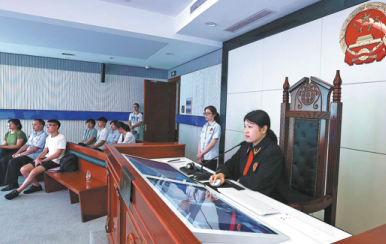
From the People’s Daily app.
This is Story in the Story.
The popularity of the internet in China has grown rapidly in the past decade.
The number of internet users in China hit 802 million at the end of June, up 3.8 percent from six months ago, according to a report on the country's internet development released Monday.
The increase brought the country's internet availability rate to 57.7 percent, with 26.3 percent of internet users living in rural areas, according to the 42nd bi-annual statistical report from the China Internet Network Information Center (CNNIC). It also highlighted the growing use of the internet among those aged between 30 to 49.
Among all the 802 million internet users, online shopping and online payment users accounted for 71 percent of the total users.
Online shoppers numbered 569 million. The value of online retail sales reached 4.08 trillion yuan (about 594 billion US dollars) during the first half of 2018.
Online takeout service users also continued to increase. As of June 2018, 43.6 percent of Chinese internet users had used mobile phones to order takeout food.
In addition, the number of online financial service users in June increased by 39.74 million, up 30.9 percent from the end of 2017.
Due to the increasing number of internet service users, many issues and disputes have been arising.
Today's Story in the Story will look at how China's first "cyber-court", located in Hangzhou, East China's Zhejiang Province, handles internet-related disputes.

A judge hears a case on infringement of information-dissemination rights at the Hangzhou Court of the Internet on Friday.(Photo: China Daily)
According to the Zhejiang provincial high court, Hangzhou courts handled about 10,000 cases related to e-commerce in 2016, up from about 600 in 2013.
On June 26, 2017, the establishment of the cyber court was formally approved at a meeting of the Leading Group for Overall Reform presided over by President Xi Jinping.
The average time of hearings conducted online was 25 minutes, according to the internet court.
The first case of Hangzhou cyber court involved a copyright infringement dispute between an online writer and a web company.
Judges were sworn in and the first case was presented on a large screen in the courtroom.
Defendants and plaintiffs appear before the judge not in person, but via video-chat.
Legal representatives in Hangzhou and Beijing accessed the court of the first case operated via their computers and the trial lasted 20 minutes.
"The internet court breaks geographic boundaries and greatly saves time in traditional hearings," said Wang Jiangqiao, the court's vice-president, via state media.
The Hangzhou Court of the Internet is responsible for hearing six types of civil and administrative internet-related cases in the city, such as those involving online intellectual property rights and e-commerce disputes. It will also handle other web-related cases designated by higher courts, according to the court.
"The establishment of the court is to meet the growing legal demand from litigants. It will also help the public to solve online disputes more effectively," Zhou Qiang, Chief Justice and president of the Supreme People's Court, said after visiting the court in 2017.
He said the new court will play an important role in maintaining a safe internet and must provide good legal service to litigants.
"Our aim is to make court hearings keep pace with the fast development of cyberspace and to explore new ways of hearing lawsuits so that it can be expanded across the country," said Zhu Shenyuan, vice-president of the Zhejiang Provincial High People's Court.
Cheng Jianle, deputy director of the provincial high court's research office, said the court's location was carefully chosen.
Hangzhou is home to such technology enterprises as Alibaba, the company behind the Alipay mobile payment system, and the Taobao online marketplace. Because of this, the city has witnessed a soaring number of online disputes in recent years, he said.
"The online hearings make our work more transparent and facilitate litigants," said Du Qian, president of the internet court, adding that the court will enhance technology support to prevent network failures.
Zhou Hanhua, a law professor at the Chinese Academy of Social Sciences, said the court represents progress, since it's the first to put all legal proceedings online. "But the court still faces challenges, such as how to facilitate those litigants who are not familiar with the internet."
Yang Ming, deputy director of the internet law center at Peking University, said that authenticating evidence provided online needs further study.
(Produced by Nancy Yan Xu, Terry Guanlin Li, Raymond Mendoza, and Lance Crayon. Music by: bensound.com. Text from China Daily and Global Times.)


